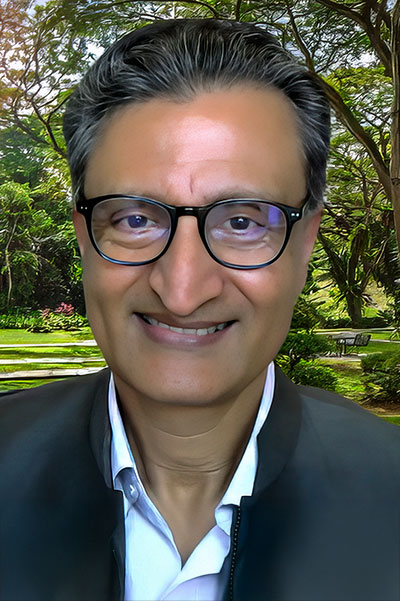Discovery Science Plenary to feature new insights into cancer evolution
The plenary program of the AACR Annual Meeting 2025 kicks off this afternoon with the Discovery Science Plenary: Novel Mechanisms Influencing Cancer Evolution, spotlighting exciting advances in the understanding of cancer evolution. The plenary program continues Monday, Tuesday, and Wednesday mornings, with a closing plenary Wednesday afternoon summarizing the meeting’s key takeaways.
Today’s Plenary Session will take place from 4:15 to 6:15 p.m. CT in Hall B1 of McCormick Place North (Level 3).

Cancers progress by exploiting multiple mechanisms that normally work together to keep our tissues in healthy homeostasis. The trajectory of cancer evolution varies among different tissues and is influenced by distinct genetic and environmental factors, said National University of Singapore’s Ashok Venkitaraman, MBBS, PhD, FAACR, the chair of the Discovery Science Plenary and an Annual Meeting program cochair.
“This session will bring together a diverse array of distinguished speakers to consider recent advances in our understanding of how some of these factors guide the evolution of different forms of cancer,” said Venkitaraman.
From mutagenesis and metabolism, to the microbiome and dictating the destiny of cancer cells, the first four speakers of this year’s plenary program will highlight how a better grasp of these phenomena could radically transform cancer care.
Understanding genetic mutations is fundamental to solving the cancer puzzle. Inigo Martincorena, PhD, of Wellcome Sanger Institute, will peer into the process through which mutations arise in tissues and contribute to somatic mosaicism, where cells from the same lineage have different genomes because of unique mutational events.
“Premalignant cells carrying cancer-associated somatic mutations accumulate in apparently normal tissues, and these can fuel carcinogenesis,” according to Venkitaraman, who said that Martincorena will discuss new insights from human population studies on the prevalence of somatic mosaicism in different tissues.
Ultimately, a better understanding of these details could enable effective intervention before tissues reach an oncogenic tipping point, he explained.
“Abnormalities in cellular or systemic metabolism can also promote carcinogenesis,” noted Venkitaraman in reference to the talk by M. Celeste Simon, PhD, FAACR, of the University of Pennsylvania Perelman School of Medicine, who will shine a light on efforts to target metabolic pathways in cancer. Simon’s primary focus will be on approaches against liver cancer-related metabolic alterations, which might be applicable to other tumors that also manipulate metabolism, both in their local microenvironment and in other tissues.
Yang Shi, PhD, FAACR, of the Ludwig Institute for Cancer Research, will investigate the interplay between epigenetics and intracellular signaling that determines the fates of cancer cells. Shi will share recent data regarding efforts to perturb epigenetic and signaling pathways together in order to induce differentiation of leukemia cells and force them to mature into nonproliferating cells.
Nicola Segata, PhD, of the University of Trento, will envision how to improve cancer care by leveraging the human microbiome. A better understanding of the diversity of the microorganisms inside the body—and how they interact with various cells to promote or resolve tumor-supporting inflammation—could enable the design of superior diagnostic and therapeutic tools.
“We cannot effectively diagnose, treat or intercept different cancers if we do not comprehend what underlies their origins,” stressed Venkitaraman. “Understanding cancer evolution in different tissues is therefore highly relevant not only to cancer biology, but also to effective clinical management.”
Refer to the Annual Meeting App and Online Itinerary Planner for the most up-to-date information on session dates, times, and locations.
More from the AACR Annual Meeting 2025
View a photo gallery of scenes from Chicago, continue the conversation on social media using the hashtag #AACR25, and read more coverage in AACR Annual Meeting News.

